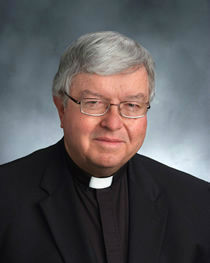
Faith
Because of the Church's belief in the real presence of Christ in the Eucharist, desecration of the host is considered a grave sin.

Doyle
Q. I have recently volunteered to attend adoration of the Blessed Sacrament as a "guardian." I do this twice a week. I have been wondering this: What happens if the monstrance and Eucharist is stolen? The monstrance can be replaced, but I have heard that a priest may have to reconsecrate the church itself. (Baltimore)
A. Because of the Church's belief in the real presence of Christ in the Eucharist, desecration of the host is considered a grave sin. In fact, Canon 1367 of the Code of Canon Law says that a person who takes or retains the consecrated species for a sacrilegious purpose incurs an excommunication that can only be lifted by the Holy See.
Unfortunately, this scenario is not hypothetical. In 2020, at the Shrine of Our Lady of Guadalupe in Manhattan, a thief took from the parish's adoration chapel a small gold monstrance that contained the Blessed Sacrament. A few days later, an auxiliary bishop of New York led a prayer service at the church that included an act of reparation for the theft.
At the service, Bishop Edmund J. Whalen spoke of the centrality of the Eucharist, saying that "Jesus lives in us through the Eucharist, he nourishes the world with his presence. ... This is the realization of our faith."
The parish administrator noted, "We ask for forgiveness from the Lord for the person who has done this."
In 2019, at Holy Spirit Parish in El Paso, Texas, intruders broke into the church and stole items including the tabernacle with the Blessed Sacrament. The pastor of the parish, calling the theft "the desecration of the greatest gift possessed by the church," invited parishioners to make reparation by visits to Jesus in the Blessed Sacrament.
With neither of the thefts was there mention of a ceremony to "reconsecrate" the church building, and I am not aware of any canonical mandate to that effect.
Q. Is it still considered a mortal sin to miss Mass on Sundays or holy days without a good reason? Where in the Bible does it say that? I think it should be a matter of personal choice. I love to go to Mass, and I have never missed except when I had to, but I don't think it should be that strict. (Iowa City, Iowa)
A. It is still considered a mortal sin to miss Mass on a day of obligation without a good reason. The Church has always believed that this obligation stems from the Ten Commandments given to Moses, one of which was to "Remember the Sabbath day, to keep it holy."
The requirement dates to the early days of Christianity and was written into the legal code of the Church from the first centuries.
The Old Testament Sabbath was on Saturday, marking God's "day of rest" following the creation of the world; Christians, instead, have always kept holy Sunday, since it marked the day of Christ's resurrection, which completed the Lord's work of salvation.
The Church has always understood that being a Christian is not just a private matter; while we engage in private worship and prayer throughout the week, our primary form of worship is public and communal, which is why Sunday Mass is so central.
The teaching of the Church on this could not be more clear. The Catechism of the Catholic Church says:
"The Sunday Eucharist is the foundation and confirmation of all Christian practice. For this reason, the faithful are obliged to participate in the Eucharist on days of obligation, unless excused for a serious reason (for example, illness, the care of infants) or dispensed by their own pastor. Those who deliberately fail in this obligation commit a grave sin" (No. 2181).
I should note here that gravity of matter is just one of three necessary conditions for a mortal sin -- the others being complete consent of the will and full knowledge of the sinful character of the act or omission.
And certain circumstances can excuse one from attendance -- such as unavoidable work obligations or inclement weather sufficient to put one's safety at risk.
Currently, of course -- during the COVID-19 pandemic -- the obligation to attend Sunday Mass has been lifted in many parts of the world, including in most of the United States.
- Father Kenneth Doyle is a columnist for Catholic News Service
Recent articles in the Faith & Family section
-
The Eucharistic Prayers -- variety and similarityFather Robert M. O'Grady
-
A Most Unusual Mission MosaicMaureen Crowley Heil
-
A new windScott Hahn
-
Scripture Reflection for May 19, 2024, Pentecost SundayJem Sullivan
-
Can I go to a Methodist church since there are no Catholic churches nearby?Jenna Marie Cooper


















